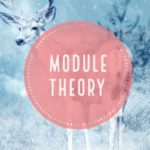A Module is Irreducible if and only if It is a Cyclic Module With Any Nonzero Element as Generator

Problem 434
Let $R$ be a ring with $1$.
A nonzero $R$-module $M$ is called irreducible if $0$ and $M$ are the only submodules of $M$.
(It is also called a simple module.)
(a) Prove that a nonzero $R$-module $M$ is irreducible if and only if $M$ is a cyclic module with any nonzero element as its generator.
(b) Determine all the irreducible $\Z$-modules.
Sponsored Links
Contents
Proof.
(a) Prove that a nonzero $R$-module $M$ is irreducible if and only if $M$ is a cyclic module with any nonzero element as its generator.
$(\implies)$ Suppose that $M$ is an irreducible module.
Let $a\in M$ be any nonzero element and consider the submodule $(a)$ generated by the element $a$.
Since $a$ is a nonzero element, the submodule $(a)$ is non-zero. Since $M$ is irreducible, this yields that
\[M=(a).\]
Hence $M$ is a cyclic module generated by $a$. Since $a$ is any nonzero element, we conclude that the module $M$ is a cyclic module with any nonzero element as its generator.
$(\impliedby)$ Suppose that $M$ is a cyclic module with any nonzero element as its generator.
Let $N$ be a nonzero submodule of $M$. Since $N$ is non-zero, we can pick a nonzero element $a\in N$. By assumption, the non-zero element $a$ generates the module $M$.
Thus we have
\[(a) \subset N \subset M=(a).\]
It follows that $N=M$, and hence $M$ is irreducible.
(b) Determine all the irreducible $\Z$-modules.
By the result of part (a), any irreducible $\Z$-module is generated by any nonzero element.
We first claim that $M$ cannot contain an element of infinite order. Suppose on the contrary $a\in M$ has infinite order.
Then since $M$ is irreducible, we have
\[M=(a)\cong \Z.\]
Since $\Z$-module $\Z$ has, for example, a proper submodule $2\Z$, it is not irreducible. Thus, the module $M$ is not irreducible, a contradiction.
It follows that any irreducible $\Z$-module is a finite cyclic group.
(Recall that any $\Z$-module is an abelian group.)
We claim that its order must be a prime number.
Suppose that $M=\Zmod{n}$, where $n=ml$ with $m,l > 1$.
Then
\[(\,\bar{l}\,)=\{l+n\Z, 2l+n\Z, \dots, (m-1)l+n\Z\}\]
is a proper submodule of $M$, and it is a contradiction.
Thus, $n$ must be prime.
We conclude that any irreducible $\Z$-module is a cyclic group of prime order.
Related Question.
Here is another problem about irreducible modules.
Prove that the $R$-module $M$ is irreducible if and only if $M$ is isomorphic to $R/I$, where $I$ is a maximal ideal of $R$, as an $R$-module.
For a proof of this problem, see the post “A Module $M$ is Irreducible if and only if $M$ is isomorphic to $R/I$ for a Maximal Ideal $I$.“.
 Add to solve later
Add to solve later
Sponsored Links










1 Response
[…] the post “A module is irreducible if and only if it is a cyclic module with any nonzero element as generator” for a […]